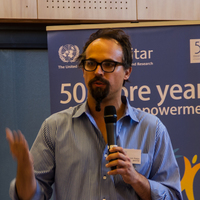Papers by Jennifer Ida
Frontiers in Public Health , 2021
Journal of Dairy Science, 2022
Journal of the American Veterinary Medical Association , 2022

Oxygen isotope data (expressed as δ18O values) recovered from human skeletal remains have been th... more Oxygen isotope data (expressed as δ18O values) recovered from human skeletal remains have been the central focus of a number of archaeological analyses tracking human migration. However, in the Andes the use of oxygen isotopes to investigate residential mobility is subject to two issues addressed in this study: 1) local variation in water sources and 2) pre-consumption processing of water. To explore these factors we sampled a wide variety of water sources in the Moche watershed of north coastal Peru and experimentally and ethnographically produced chicha de maíz, a traditional brewed beverage. Our data indicate an unexpected spatial pattern in Moche valley water source δ18O values, and identify springs as an important influence on river water. Using chicha de maíz as an example of pre-consumption processing of water, we find that brewed beverages may impact human δ18O values. Together these data indicate that in the Andes the consumption of chicha de maíz has the potential to swamp spatial variation in water source δ18O values. Therefore, we cannot assume that the identification of different δ18O values in the remains of Andean groups necessarily indicates the presence of migrants
Thesis Chapters by Jennifer Ida

The focus of this thesis is to provide a holistic understanding of the political, cultural, envir... more The focus of this thesis is to provide a holistic understanding of the political, cultural, environmental, and biological factors that may be contributing to increased vulnerability to anthrax in Wayuu and non-Wayuu human and livestock communities in La Guajira, Colombia. Qualitative data collection was undertaken during a three month period from May to August 2014. A total of 14 semi-structured interviews were conducted with Wayuu and non-Wayuu herdowners, veterinarians, and government public health officials. Direct observations were collected on rancherías and farms in La Guajira throughout the duration of the study. The findings of this study suggest that the anthrax-drought relationship is mediated by several high-impact factors, primarily large and small scale animal movement. These anthropological insights will contribute to a greater understanding of human-animal relations in complex ecological contexts and to the ongoing reframing of international public health into a more holistic, locally-responsive, global health practice.











Uploads
Papers by Jennifer Ida
Thesis Chapters by Jennifer Ida